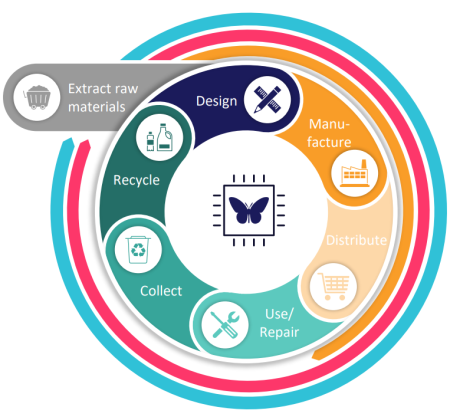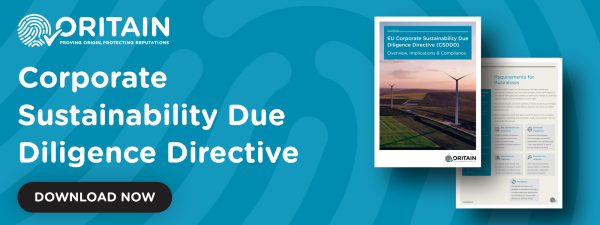EU Digital Product Passport: Regulation, Compliance and Supply Chain Impact
By Michela Mossali | 30 September 2024
minutes to read.

Sustainability will have an increased focus in the European Union with the coming implementation of a new Digital Product Passport (DPP) – and product origin is a key component.
The DPP is part of the Ecodesign for Sustainable Products Regulation, which was approved in June 2024. It functions as a digital identity card for products, components, and materials, used for the storing of relevant information to support the sustainability and circularity of products.
DPPs are set to be a milestone for compliance, supply chain transparency, and sustainability, underpinning the European Union's strategy to promote a circular economy and enhance sustainability. They represent a fundamental shift in how products are made, used, and managed throughout their entire lifecycle.
While the scope of the Passport initially covers mainly energy-related products, it will then be expanded to include textiles and other sectors.
The introduction of the DPP reflects that the origin of raw materials is once more a cornerstone of major EU legislation. It reinforces that as regulators, consumers and investors increasingly demand and prioritize sustainable products, proven origin verification is essential.
How the EU Digital Product Passport Supports Sustainability and Circular Economy Goals
The Ecodesign for Sustainable Products Regulation (ESPR) entered into force in July 2024 as part of a raft of measures intended to support the EU’s environmental and climate goals.
A key aspect of the ESPR is improving the sustainability profile of products placed on the EU market, and the Digital Product Passport is one initiative designed to enable this.
It requires all products placed on the European market to have a machine-readable product passport, such as a QR code, which is linked to a unique product ID. This digital record will store information about a product’s environmental footprint throughout its lifecycle.
In introducing this, the European Commission stated, “Digital Product Passports [are] to be the norm for all products regulated under the ESPR, enabling products to be tagged, identified and linked to data relevant to their circularity and sustainability.”
The objective of this is to enable markets to make more informed decisions related to product sustainability and circularity.

Circular economy graphic (source: BCG)
The information required for collection and storage is still being defined, but is anticipated to include details on:
- The product’s durability, reusability and repairability
- Materials used and their origins
- Percentage of recycled content
- The product’s carbon footprint
- The product’s circularity
This information will be accessible to consumers, manufacturers and regulators through a dedicated web portal. It will enable authorities to perform checks on imported products to validate that Passports exist and that they are both current and authentic.
As a result, the environmental impact of a wide range of products will be considerably more visible and traceable than ever before – and businesses will need to be prepared for that.
How the DPP Relates to Other EU Legislation
The Digital Product Passport is the latest in a series of EU legislation concerned with environmental protection and sustainability. These include:
- Corporate Sustainability Due Diligence Directive (CSDDD): Requires companies to have greater oversight of environmental and social impacts through their supply chain
- EU Deforestation Regulation (EUDR): Permits only products from non-degraded or deforested land from being imported into or exported from the EU market
- EU Forced Labour Ban: Prohibits products made with forced labour from entering or exiting the EU market
- Directive to combat greenwashing and promote sustainability: Enforces stricter rules around product labelling and prohibits misleading environmental claims
DPP compliance is part of sustainability reporting and connects with broader ESG disclosures. Where the DPP differs is in the scale of coverage.
Because there are no restrictions on the type of products, the scope of enforcement is potentially much broader than, for example, the EUDR, which is focused solely on products linked to deforestation concerns.
It means that every product available in the EU via retail shelves or online stores will in time require a unique Passport.
EU Digital Product Passport Timeline and Rollout
The Digital Product Passport will be rolled out by industry between 2025-2030. Given the high environmental impact of textile manufacture, the requirements for this industry are expected to be given priority and released in mid-2025.
Specific requirements for the remaining primary product groups are expected to be finalized by 2030.
This timeframe for rollout allows companies time to begin identifying data requirements and assessing any information gaps which could impede DPP compliance – such as environmental impact data or product origin verification.
What the DPP Means for Businesses
The Digital Product Passport requires companies to keep more detailed information about the origin, materials and environmental impact of their products.
Failing to do so will risk incurring noncompliance penalties which could impact a company's market access, financial health, and brand reputation.
- Products without a compliant DPP may be blocked from entering the EU market at the border.
- The Ecodesign for Sustainable Products Regulation (ESPR), which mandates DPPs, allows for the imposition of fines on non-compliant companies.
- Supply chain disruptions could result from noncompliance, as products without the required DPP cannot be processed or sold.
- Noncompliance can lead to accusations of "greenwashing," damaging brand equity and consumer loyalty.
The DPP will also have a global impact beyond EU market boundaries, as the European Commission plans to enforce the regulation on imported products, their components and intermediary products, with importers being held responsible for ensuring compliance requirements are met.
This will significantly impact global value chains, obliging suppliers and producers around the world to collect and report on the required data. Furthermore, the regulation could potentially trigger lawmakers in other geographies to adopt DPPs in the future.

However, the Passports can also be advantageous for companies. The enhanced transparency could help shine a light on supply chain practices that suggest fraud or other irregularities.
This could help brands resolve how product traceability drives sustainability and ESG in supply chains.
It can also enable companies to optimize their processes to deliver more sustainable outputs, which can then be leveraged in promotional activities to bolster the company’s brand and customer reputation.
To prepare for the DPP, businesses will need to take several steps, encompassing:
- Data collection
- Supplier engagement
- Reporting systems
But acquiring and maintaining the necessary information may pose a challenge initially. Determining what product data can be retrieved from current reports, then identifying and gathering missing data, will require significant time and resourcing.
Given that companies must disclose their environmental footprint, and since one of the highest manufacturing impacts comes from raw materials, it’s therefore important for companies to have robust information on the sourcing or origin of their raw materials.

Why Product Origin Verification is Key for DPP Compliance
Without knowledge of product origin, companies will be challenged to adequately complete the requisite product record.
Most European companies have already begun the process of collecting this information and measuring their impact assessment based on raw material origins.
In addition, certain producers in rural sectors are doing likewise, many at the request of customers who need disclosures of CO2 emissions to populate their reporting requirements.
Scientific verification is a tool for origin authentication that offers the highest levels of robustness and accuracy. Through forensic analysis of the elements inherent in all natural products, the origin of products and raw materials can be defined with scientific precision. This includes materials such as cotton and other fibres, coffee, red meat, dairy, horticulture and aquaculture.
This addresses why science in traceability matters for brands and retailers.
Oritain has been a market leader in scientific origin verification for over 15 years. Through our pioneering methodology, we can provide essential data on product origin to support companies in fulfilling their DPP reporting requirements.
(Image credit: Vecteezy)
To learn more about how Oritain can help your organization comply with EU regulations, contact us to speak with one of our team.
Disclaimer: The information provided in this document does not and is not intended to constitute legal advice. Instead, all information presented here is for general informational purposes only. Counsel should be consulted with respect to any particular legal situation.





